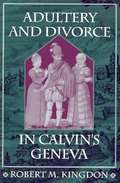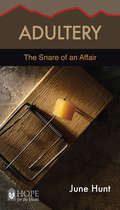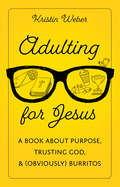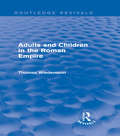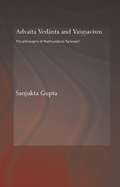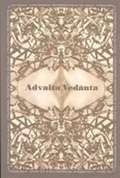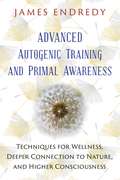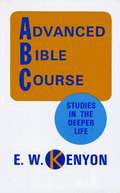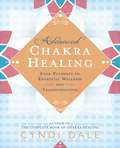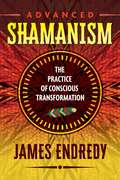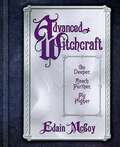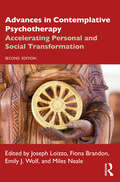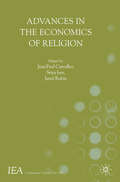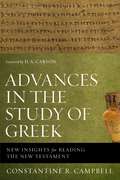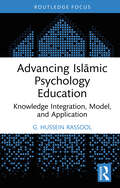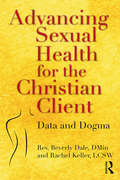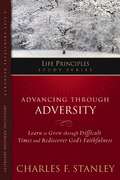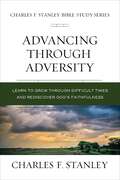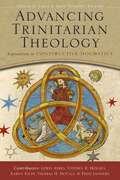- Table View
- List View
Adult Bible Study Spring 2013
by Ellsworth KalasStudy guide for the spring 2013 Adult Bible Study series.
Adult Bible Study Summer 2013
by Chuck AaronAdult Bible Study book by Chuck Aaron, pastor at Whaley United Methodist Church in Gainesville, Texas.
Adult Bible Study Summer 2014
by Lori BroschatLessons for the Summer 2014 session of Adult Bible Study.
Adult Bible Study Winter 2013
by Simon Peter IredaleLessons for the Winter 2013 adult Bible study session.
Adult Continuing Education and High School Course Catalog
by Hadley Institute for the Blind Visually ImpairedAdult Continuing Education and High School Course Catalog 2016-2017. Catalog of current distance education courses for the blind or visually impaired. Various media for the courses is available including; Braille, CD, Digital Talking Books, Large Print, Online and more. Not all courses are available in all formats.
Adultery and Divorce in Calvin’s Geneva (Harvard Historical Studies #118)
by Robert M. Kingdon<p>In Calvin's Geneva, the changes associated with the Reformation were particularly abrupt and far-reaching, in large part owing to John Calvin himself. Adultery and Divorce in Calvin's Geneva makes two major contributions to our understanding of this time. The first is to the history of divorce. The second is in illustrating the operations of the Consistory of Geneva--an institution designed to control in all its variety the behavior of the entire population--which was established at Calvin's insistence in 1541. This mandate came shortly after the city officially adopted Protestantism in 1536, a time when divorce became legally possible for the first time in centuries. <p>Robert Kingdon illustrates the changes that accompanied the earliest Calvinist divorces by examining in depth a few of the most dramatic cases and showing how divorce affected real individuals. He considers first, and in the most detail, divorce for adultery, the best-known grounds for divorce and the best documented. He also covers the only other generally accepted grounds for these early divorces--desertion. <p>The second contribution of the book, to show the work of the Consistory of Geneva, is a first step toward a fuller study of the institution. Kingdon has supervised the first accurate and complete transcription of the twenty-one volumes of registers of the Consistory and has made the first extended use of these materials, as well as other documents that have never before been so fully utilized.</p>
Adultery: The Snare Of An Affair (Hope for the Heart)
by June HuntHas your heart been broken by a cheating husband or cheating wife? Has your life been gripped by the agony of adultery? Adultery is no small matter, especially for those who experience the intense pain of living with a spouse who breaks the marriage covenant. June Hunt provides Christian counseling on how to find hope in God. But, this is more than Christian marriage counseling—it shows how to find healing, hope, and forgiveness after the devastation of an affair. June defines adultery and reveals the warning signs of adultery, such as change in mood, appearance, spending, etc. She provides practical ways and sound biblical wisdom in answering tough questions, such as--• What can I do to ensure that I will be faithful when I feel attracted to someone beside my spouse?• My husband had numerous affairs and now wants to reconcile. Should we get back together?• Why does anyone get involved in adultery? Is it my fault?•Is it wrong to try to find out whether or not my spouse is being unfaithful? If it's not wrong, what is the best way to do so?June illustrates the consequences of adultery by retelling the story of David, a man of God who fell into the temptation of having an affair, which led to guilt-ridden "cover ups" and a strained relationship with God. She goes on to explain the causes, characteristics, and consequences of adultery, such as the--• 9 false promises of adultery• 9 characteristics of an adulterer• 9 common reasons people get sucked into adulteryIn the section titled, "Steps to Solution," June Hunt explains--• How an adulterer can change--for good. • 6 common mistakes made by the faithful spouse• 6 ways the faithful spouse can respond to adultery in a healthy way• How to prepare and conduct a crisis intervention
Adulting for Jesus: A Book about Purpose, Trusting God, and (Obviously) Burritos
by Kristin WeberIs adulthood a curse? What should I do with all these participation trophies? As young adults try to figure things out and answer deep, soul-heavy questions, they&’re given flak for living in &“extended adolescence.&” In a world that insists we can (and should) have it all, Adulting for Jesus uses humor to offer topical advice and encouragement for those who are asking, &“Is this really all there is?&” Develop realistic expectations and a healthy, godly outlook on life for: relationshipscallingblessingsservingsabbathsocial mediaanxiety Readers will find that by learning to laugh at themselves and find humor in situations, the reduced stress and anxiety makes the ride so much more enjoyable. Most importantly, the more young adults learn about God and see His faithfulness in their lives, the more they grow to love His will, even if it&’s not exactly what they imagined.
Adults and Children in the Roman Empire (Routledge Revivals)
by Thomas WiedemannThere is little evidence to enable us to reconstruct what it felt like to be a child in the Roman world. We do, however, have ample evidence about the feelings and expectations that adults had for children over the centuries between the end of the Roman republic and late antiquity. Thomas Wiedemann draws on this evidence to describe a range of attitudes towards children in the classical period, identifying three areas where greater individuality was assigned to children: through political office-holding; through education; and, for Christians, through membership of the Church in baptism. These developments in both pagan and Christian practices reflect wider social changes in the Roman world during the first four centuries of the Christian era. Of obvious value to classicists, Adults and Children in the Roman Empire, first published in 1989, is also indispensable for anthropologists, and well as those interested in ecclesiastical and social history.
Advaita Vedanta and Vaisnavism: The Philosophy of Madhusudana Sarasvati (Routledge Hindu Studies Series)
by Sanjukta GuptaIn Indian philosophy and theology, the ideology of Vedanta occupies an important position. Hindu religious sects accept the Vedantic soteriology, which believes that there is only one conscious reality, Brahman from which the entire creation, both conscious and non-conscious, emanated. Madhusudana Sarasvati, who lived in sixteenth century Bengal and wrote in Sanskrit, was the last great thinker among the Indian philosophers of Vedanta. During his time, Hindu sectarians, rejected monistic Vedanta. Although a strict monist, Madhusudana tried to make a synthesis between his monistic philosophy and his theology of emotional love for God. Sanjukta Gupta provides the only comprehensive study of Madhusudana Sarasvati's thought. She explores the religious context of his extensive and difficult works, offering invaluable insights into Indian philosophy and theology.
Advaita Vedanta: A Philosophical Reconstruction
by Eliot DeutschAn introduction to the several systems of classical Indian thought such as Professor Deutsch provides.
Advanced Autogenic Training and Primal Awareness: Techniques for Wellness, Deeper Connection to Nature, and Higher Consciousness
by James EndredyA step-by-step guide to optimize health, reconnect with Nature, and access the vast knowledge of the universe through autogenic training • Provides step-by-step instructions for 40 autogenic and primal mind techniques • Explains how to add healing affirmations and visualizations to autogenic practice as well as work with colors and chakras • Includes techniques to restore our primal connection to the world of Nature through practices such as Forest Bathing, Nature’s Breath, and Feeling in the Dark Developed by German doctor Johannes Schultz in the early 20th century, autogenic training teaches you how to use the mind-body connection to influence and regulate the body’s normally involuntary autonomic functions by passively tapping into your central and peripheral nervous systems. Often used for stress relief, autogenic training can also be used for asthma, chronic pain, migraines, constipation, anxiety, panic attacks, and a host of other conditions. In this book, James Endredy takes autogenic training to a new level, revealing how to use AT practices to optimize health as well as reawaken your senses, reconnect with Nature and tap into the vast knowledge and power of the universe. Beginning with the 7 standard formulas of AT, the author provides step-by-step instructions for 40 AT and primal mind techniques. He explains how to add specific healing affirmations and visualizations to your AT practice as well as how to work with colors and the chakras. He offers advanced trainings to rekindle your primal touch sensitivity, experience enhanced sight and hearing, and awaken your primal sense of smell. He reveals how to use AT to restore our primal connection to the world of Nature through practices such as Forest Bathing, Nature’s Breath, and Primal Fire Connection. Drawing on more than 25 years of experience living and working with indigenous cultures, including the Huichol, Iroquois, Sioux, Maya, and Hopi, Endredy shows how, much like a vision quest, this unique combination of AT and primal mind awareness offers rites of passage sorely missing from modern life. It gives you the tools to go deeper into your physiological being, to directly experience how we relate to the world, and to reconnect with the ancient wisdom within each of us.
Advanced Bible Course, Studies in the Deeper Life
by E. W. KenyonThis Book is a follow up to the book called The Bible in the Light of Our Redemption, by E. W. Kenyon. It is a deeper study of the Bible and how it influences our life. I found this book very enlightening. Once I started reading it, I could not put it down. As a result of reading this book, I have found a deeper appreciation for the Bible and I have reached a higher spiritual level of existence.
Advanced Chakra Healing: Four Pathways to Energetic Wellness and Transformation
by Cyndi DaleRemove Energy Blocks and Achieve True Healing through the Four PathwaysJoin world-renowned energy healer and bestselling author Cyndi Dale as she provides a comprehensive guide to energy and chakra work using the four pathways healing system. The concepts and techniques of this potent approach are designed to be totally aligned with divine love so that you can achieve the awakened state that brings true healing.Featuring nearly fifty hands-on exercises and a full-color insert, this book shows you how to negotiate the pathways—elemental, power, imaginal, and divine—through the subtle energy organs known as the chakras. You will explore the energy patterns and programs that underlie imbalances and illness and learn methods for energy mapping as well as Cyndi's signature Spirit-to-Spirit practice. The four pathways are interconnected and dynamic, so when you transform one you transform them all, leading to healing outcomes that are based in the unifying energy of love.Foreword by Dr. (Doc) C. Michael Scroggins, PhD,CEng, CMarEng, FIMarEST
Advanced Shamanism: The Practice of Conscious Transformation
by James EndredyA step-by-step guide to authentic advanced shamanic practices • Offers hands-on instructions for more than 30 practices, including sacred Fire ceremonies, direct shamanic viewing, shamanic death and rebirth, working with healing stones, shamanic lucid dreaming, shamanic healing, and advanced methods for acquiring an animal spirit guide • Allows solitary shamanic practitioners to advance their practice • Examines the biological foundations of spiritual experience, the many ways that Psi phenomena and shamanism are linked, and their relationship to the scientific concept of quantum entanglement In this step-by-step guide to more than three dozen advanced shamanic practices, James Endredy shares the wisdom and techniques he has learned through 30 years of working with shamanic teachers from all over the globe, including Huichol kawiteros, Tibetan lamas, Incan, Mayan, and Tukano shamans, Indian siddhas, the Kanaka Maoli of Hawai’i, and elders from many Native American tribes, such as the Seneca, Lenni Lenape, Arapaho, Sioux, Tuscarora, Yurok, Navajo, and Hopi. Endredy offers hands-on instructions for sacred Fire ceremonies, direct shamanic viewing, experiencing shamanic death and rebirth, working with and acquiring healing stones, shamanic lucid dreaming, shamanic healing, and advanced methods for acquiring an animal spirit guide, including how to properly retain its spirit in a sacred bundle or altar and how to use its power responsibly for healing. He provides a meticulous step-by-step approach to working with the five points of attention, a Huichol teaching on sacred awareness and shamanic levels of attention. He also examines the many ways that Psi phenomena and shamanism are linked and their relationship to the scientific concept of quantum entanglement. Showing how quantum physics is the scientific expression of shamanism, the author also explores the biological foundations of spiritual experiences, including the roles of serotonin, dopamine, and opioid transmitters, and the connections between altered consciousness and shamanic states. Integrating modern research with ancient knowledge to provide an enlightened view of shamanism that marries science and spirit, this guide offers authentic shamanic wisdom and techniques to help the solitary practitioner move forward on their shamanic path.
Advanced Witchcraft: Go Deeper, Reach Further, Fly Higher
by Edain McCoyIn the beginning everything is fresh and new. Learning how to cast a circle, work magick, compile a Book of Shadows, and honor the God and Goddess on esbats and sabbats can be exhilarating. But once you've mastered the basics of Witchcraft comes the real challenge of living your faith every moment of every day. Living as a Witch is knowing that you are the magick.Advanced Witchcraft doesn't contain any "Wicca 101" information—it assumes that you're already familiar with the nuts and bolts of the Craft. Instead, this book challenges you to think critically about your beliefs and practices, what they mean to you, how they've changed, and where you're going. Along the way you'll also learn many techniques for intermediate and advanced Witches, including:Meeting your shadowAdvanced warding and psychic self-defensePower animals, familiars, and shapeshiftersWorking the labyrinth and the mazeAdvanced tree spiritualityAdvanced augury and divinationMagick and ritual using the fine arts of storytelling, dance, music, art, and dramaThe art of WishcraftSpirits and lost soulsBanishing and closing portalsThe healing arts
Advances in Contemplative Psychotherapy: Accelerating Personal and Social Transformation
by Joseph Loizzo, Fiona Brandon, Emily J. Wolf, and Miles NealeAdvances in Contemplative Psychotherapy offers mental health professionals of all disciplines and orientations the most comprehensive and rigorous introduction to the art of integrating contemplative psychology, ethics, and practices, including mindfulness, compassion, and embodiment techniques. It brings together clinicians, scholars, and thought leaders of unprecedented caliber, featuring some of the most eminent pioneers in the rapidly growing field of contemplative psychotherapy. The new edition offers an expanded array of effective contemplative interventions, contemplative psychotherapies, and contemplative approaches to clinical practice. New chapters discuss how contemplative work can effect positive psychosocial change at the personal, interpersonal, and collective levels to address racial, gender, and other forms of systemic oppression. The new edition also explores the cross-cultural nuances in the integration of Buddhist psychology and healing practices by Western researchers and clinicians and includes the voices of leading Tibetan doctors. Advances in Contemplative Psychotherapy offers a profound and synoptic overview of one of psychotherapy’s most intriguing and promising fields.
Advances in the Economics of Religion (International Economic Association Series)
by Jared Rubin Sriya Iyer Jean-Paul CarvalhoThis edited collection brings together expertise from around the globe to overview and debate key concepts and concerns in the economics of religion. While the economics of religion is a relatively new field of research in economics, economists have made and continue to make important contributions to the understanding of religion. There is much scope for economists to continue to make a significant contribution to debates about religion, including its implications for conflict, political economy, public goods, demography, education, finance, trade and economic growth.
Advances in the Study of Greek: New Insights for Reading the New Testament
by D. A. Carson Constantine R. CampbellAdvances in the Study of Greek offers an introduction to issues of interest in the current world of Greek scholarship. Those within Greek scholarship will welcome this book as a tool that puts students, pastors, professors, and commentators firmly in touch with what is going on in Greek studies. Those outside Greek scholarship will warmly receive Advances in the Study of Greek as a resource to get themselves up to speed in Greek studies. Free of technical linguistic jargon, the scholarship contained within is highly accessible to outsiders.Advances in the Study of Greek provides an accessible introduction for students, pastors, professors, and commentators to understand the current issues of interest in this period of paradigm shift.
Advancing Islāmic Psychology Education: Knowledge Integration, Model, and Application (Islamic Psychology and Psychotherapy)
by G. Hussein RassoolThis book provides academic and clinical institutions for developing their educational programmes in psychology, psychotherapy, and counselling from an Islāmic paradigm. Examining the educational approach in the decolonisation of psychology curricula, the book proposes a vertically and horizontally integrated, embedded curriculum model. This model meets the changing needs of practitioners, incorporating indigenous cultural aspects and emerging technologies to reflect new and creative ways of thinking about delivering education in the post Covid-19 era. The chapters also demonstrate how curriculum development, based on the principles of Islamic education, helps institutions to establish purpose, define activities, and guide decision making in educational development. A series of steps for implementing this need-driven educational programme has been suggested. This practical, concise, and evidenced-based text will be a key resource for educators and trainers. It will help them understand how to re-design or suggest changes to curriculum structure, shape, and content in Islāmic psychology, psychotherapy, and counselling for undergraduate, postgraduate and continuing professional development levels of education.
Advancing Sexual Health for the Christian Client: Data and Dogma
by Beverly Dale Rachel KellerAdvancing Sexual Health for the Christian Client is an essential toolkit for professionals working at the intersection of Christian belief and sexual health. In this book, Beverly Dale and Rachel Keller deconstruct potentially harmful Christian beliefs around sexuality to support clients stuck in sexual guilt, shame and fear. Combining the experience of an ordained Christian clergy with a certified sexologist, this guide promotes a new approach to sex and faith for therapists, which will help their clients to reconcile a belief in God’s love with sexual knowledge and fulfilment. Grounded in historical and cultural contexts, and drawing from both academic research and scriptural exegesis, the authors offer practical clinical applications and interventions to enable clients to re-examine their sexual beliefs in a way that encourages sexual healing. By understanding the goals of a sex-positive, body-positive Christianity, professionals can find a common language with the person of faith and build an effective therapeutic relationship. This book will be a key point of reference for any sex therapist, educator, or student looking to integrate faith-based concepts into their approach.
Advancing Through Adversity: Advancing Through Adversity (Charles F. Stanley Bible Study Ser.)
by Charles F. StanleyGod has a plan and a purpose for you, and He can turn things to good regardless of the situation you face. These two key principles, rooted in Scripture and evidenced in the lives of Christians throughout the ages, must color the lenses through which you view adversity. In Advancing Through Adversity, Charles Stanley provides a new perspective on adversity. You'll learn which questions to ask and what lessons can be learned from adversity. Understanding God's role and bolstering your courage can help you advance through adversity rather than be overcome by it. The Life Principles Study Guides are perfect companions to Dr. Stanley's Life Principles Bible or for use on their own. They are a unique approach to Bible study, incorporating biblical truth, personal insights, emotional responses, and a call to action. Whether you use a study in a group or as an individual, it will help you get in touch with the Bible, God, and yourself.
Advancing Through Adversity: Rediscover God's Faithfulness Through Difficult Times (Charles F. Stanley Bible Study Series)
by Charles F. StanleyWhy does God allow adversity?God has a plan and a purpose for each of us, and He can turn things to good regardless of the situation we face. These two key principles—rooted in Scripture and seen in the lives of Christians throughout the ages—should color the lenses through which all followers of Christ view adversity.In Advancing Through Adversity, Dr. Charles Stanley provides a new perspective on the trials we face, revealing what questions to ask and what lessons can be learned from such times. Understanding God's role and bolstering our courage can help us advance through adversity rather than be overcome by it.With over 1 million copies sold, the Charles F. Stanley Bible Study Series is a unique approach to Bible study, incorporating biblical truth, personal insights, emotional responses, and a call to action.Each study draws on Dr. Stanley's many years of teaching the guiding principles found in God's Word, showing how we can apply them in practical ways to every situation we face. This edition of the series has been completely revised and updated and includes two brand-new lessons from Dr. Stanley.Each of the twelve lessons includes:Overview: A brief look at what is covered in the lesson.Life's Questions: A teaching from Dr. Stanley that unpacks the topic of the lesson.Living the Principle: Application and Bible study questions based on the key points.Reflection: Key takeaways to put into practice today and tomorrow.
Advancing Trinitarian Theology: Explorations in Constructive Dogmatics (Los Angeles Theology Conference Series)
by ZondervanAn Exploration of Different Issues in the Doctrine of the Trinity. Throughout the last century, theologians gave great attention to the doctrine of the Trinity, and they largely succeeded in restoring it to a central place in Christian thought. But as they highlighted the novelty of the revolutionary new trinitarianism, a number of generalizations crept into the discussion that requires a careful reevaluation of the classical tradition.Trinitarian Theology—the subject of the second annual Los Angeles Theology Conference—sought to make constructive progress in the doctrine of the Trinity by aligning the trinitarian revival with the ongoing task of retrieving the classical doctrine of the Trinity.The nine diverse essays in this collection include discussions on:Ways to clarify the doctrine of the Trinity without sacrificing its essential mystery.The ways in which trinitarian theology applies practically to the Christian life and mission.Highlighting the counter-revolutionary trends in the most recent trinitarian thought.Discourse on the role Karl Barth played in advancing trinitarian thought.Each of the essays collected in this volume engage with Scripture as well as with others in the field—theologians both past and present, from different confessions—in order to provide constructive resources for contemporary systematic theology and to forge a theology for the future.

